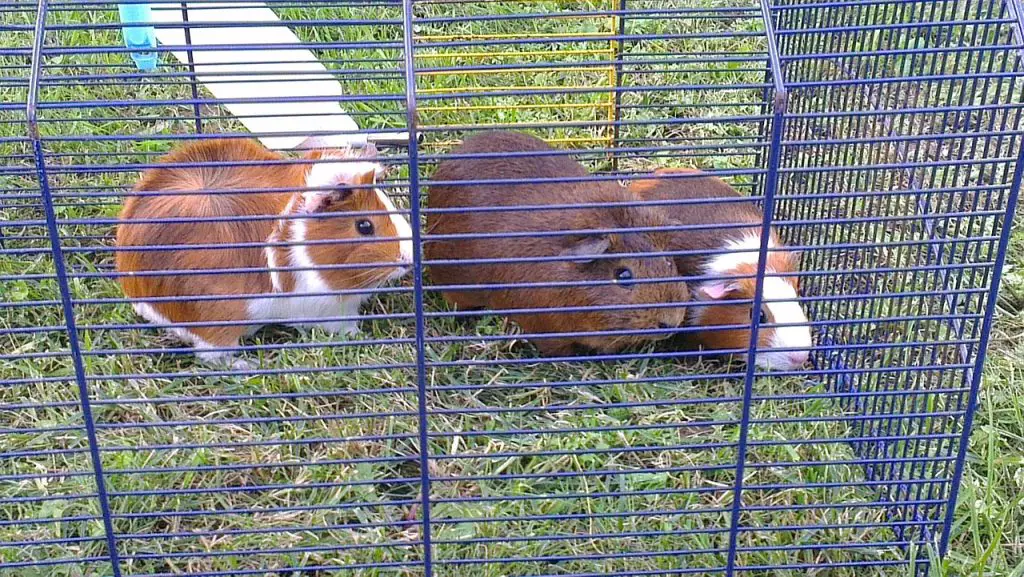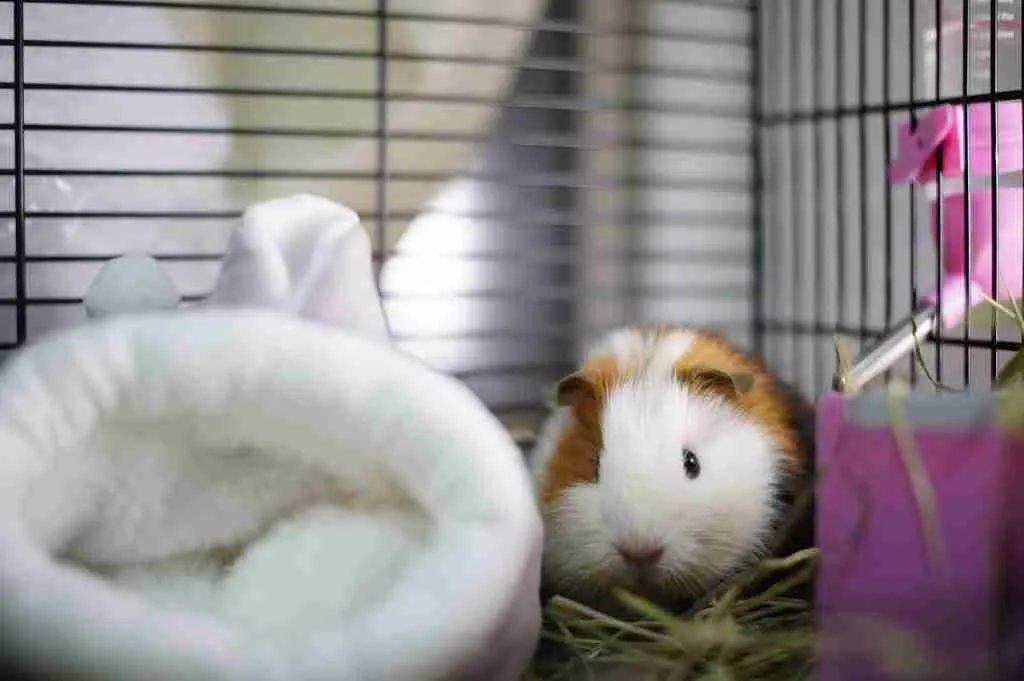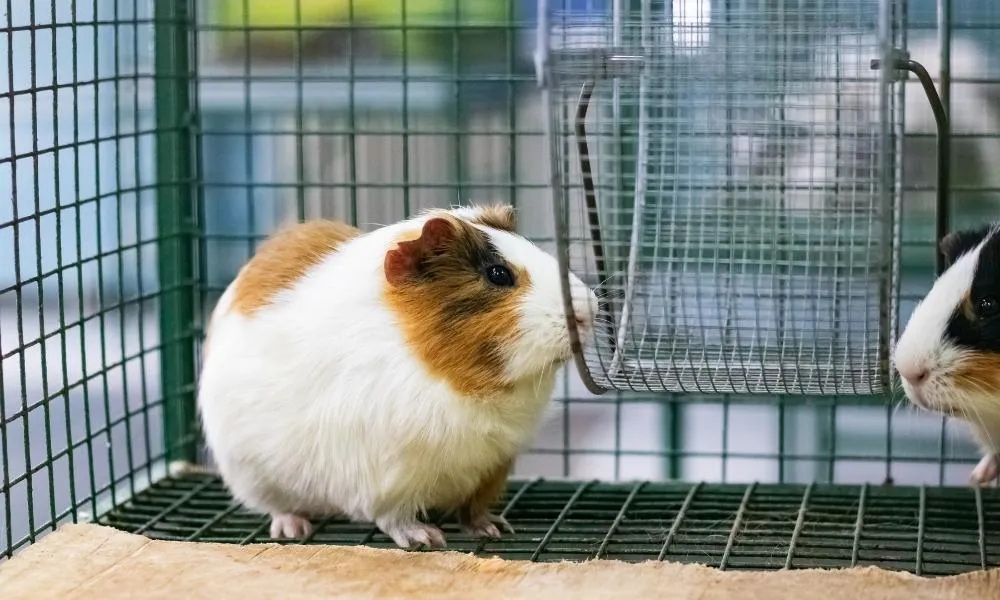Guinea pigs are small, weak animals that need to be handled with care. Therefore, one of the concerns of new pet parents is whether to keep their cavies in the house or outside.
Therefore, should you keep your guinea pigs indoors or outdoor pets?
Short answer – you can keep your guinea pigs indoors or outdoors. However, make sure the temperature in their environment is favorable, whether during summer or winter.
In addition, house them in a large space so that they can run around and play with one another freely.
You know that you can put your guinea pigs both indoors and outdoors. But which one should you choose? Are there any pros and cons that you should consider?
Continue reading to find out!
Table of Contents
Is It Better For Guinea Pigs To Live Inside Or Outside?
Deciding on the best option between keeping your guinea pigs inside or outside mostly depends on you.
Naturally, cavies love living outdoors, even in the wild. They love running around and hiding in burrows made by other animals.
Physical activities keep these small pets entertained and mentally stimulated.
However, while there are advantages to allowing your guinea pigs to live outdoors, there are disadvantages too.
Also, allowing your cavies to live inside the house has pros and cons too.
Let’s take a look at the pros and cons of keeping guinea pigs inside and outside.
Advantages (Indoor)
- Noticing signs of sickness in your pets quickly and consulting the vet.
- Protection from predators outdoors.
- Maintaining a moderate temperature is especially important when the weather is too hot or cold outside.
- You have easy access to them every time, which allows the pets to bond with you quickly.
- Constantly monitor the pets’ movements to prevent them from getting hurt.
Disadvantages (Indoor)
- There may be a disturbance in the house due to your guinea pigs’ noises.
- These small pets may not be free to run around in small cages indoors.
- There can be an unpleasant odor in the house, especially if you’ve not cleaned their cage for a few days.
- Exposure to some dangers in the house, like an electric shock, being stuck under the chair, and more.
- Damage to some items in your home, like furniture, TV remotes, and even wires, because guinea pigs love chewing.
Advantages (Outdoor)

- Outdoor cages are usually large and can allow guinea pigs to run around freely.
- Fresh air sometimes prevents your cavies’ cages from smelling, even when dirty.
- Guinea pigs’ noises will not distract you, especially if their cage is not too close to the house.
- Keeping your cavies outside can increase your chances of sleeping well at night because they are nocturnal animals.
- Sudden noises from the TV or mobile devices can scare your pets indoors, but the outdoors is relaxing for them.
Disadvantages (Outdoor)
- Guinea pigs may be exposed to too hot or extremely cold temperatures outdoors. Temperatures between 60 and 75°F are the best for them.
- If your pet’s cage is outside, there’s a chance that you won’t immediately notice signs of sickness or injuries in your pet.
- Sometimes, you may forget to groom your guinea pigs or even clean their cages.
- Spending enough time and bonding with your cavies may not be possible if they don’t lie indoors.
- Predators can easily attack them outside.
Do Guinea Pigs Like To Be Indoors Or Outdoors?
Whether they live indoors or outdoors, it doesn’t matter to guinea pigs. As we stated earlier, both inside the house and outside have benefits and disadvantages.
So it is fair to say that guinea pigs love to live in quiet, clean, dry, comfortable places. Once they’re in the perfect environment, you’ll notice that your cavies will be playing freely.
Things To Consider When Putting Your Guinea Pigs Indoors Or Outdoors
Always consider your guinea pigs’ comfort whenever you want to house them, whether indoors or outdoors. Remember that they are small pets that can easily get sick or hurt by the things in their environment.
That said, let’s take a look at the things to consider when keeping your pets indoors or outdoors:
- A comfortable and spacious cage
- Living environment with temperatures between 60 and 75°F.
- Access to healthy food, especially hay, and clean water.
- Number of guinea pigs you’ll put in a cage
- Presence of predators in your area (snakes, wild cats, wolves, etc)
- Other Pets that can scare them, such as dogs and cats, should be kept out of reach.
Is It Cruel To Keep Guinea Pigs Indoors All The Time?

No, it is not cruel to allow your guinea pigs to stay inside the house all the time. Ensure they are comfortable, healthy, and happy.
Here are simple tips to make your guinea pigs comfortable indoors:
- Provide healthy diets and clean water.
- Take them to the vet when you notice signs of illnesses.
- If there are many rooms in your house, you can set up one of them for your cavies to live in.
- Keep dangerous items like electric wires, nails, poisonous plants, and other large pets away.
- Block all holes to prevent the small pets from getting stuck in them.
- Make sure the temperature in their environment is conducive. During winter, you can always close the window, and during summer, allow fresh air into the room.
Keeping guinea pigs indoors is easy as long as you take the necessary actions to ensure they are safe.
How to House Your Guinea Pigs
Housing your guinea pigs the right way helps them to remain happy and healthy.
Therefore, follow the 6 simple tips below when planning to keep one or more.
1. Get A Large Cage.
Usually, guinea pigs love living in large environments because they love running around. Whether you want to build or buy a cage, make sure it is wide, long, and tall.
In addition, ensure that the cage has enough ventilation and is simple to clean and disassemble in the event of an emergency.
In addition, for comfort, place paper or cloth bedding at the bottom of the cage. Guinea pig beddings are not only a source of comfort for them; they also prevent the pets from hurting their legs.
2. Provide Water Bottles And Food Bowls.
While it is possible to pour your cavies’ food on the floor, it is better to serve them with bowls. Not only are bowls healthier alternatives, but they also don’t allow the cage to become messy.
Consider buying gravity water bottles because your pets can tip over water dishes or mess them up with food. Gravity bottles are usually clipped to a part of the cage and release water when your cavies need it.
Both the food bowl and water bottle must be made of strong plastic or metal so that your guinea pigs will not chew on them.
3. Keep Their Cage Away From Extreme Heat And Cold.
Avoid keeping your cavies close to the air conditioner, fan, stove, or fireplace. Too much heat can cause heatstroke and dehydration in guinea pigs, which are both serious health issues.
They can also get exposed to the cold if their environment is freezing.
To keep your guinea pigs safe, ensure that the temperature of their environment is perfect.
4. Keep Loud Noises Away From Their Environment.
Despite being friendly and social animals, guinea pigs do not like loud noises because they get afraid easily. Remember that they are prey animals and are always trying to hide from potential danger.
Therefore, keep your cavies’ cage in a very quiet place. Even if they live indoors, always keep the volume of your TV, radio, and mobile devices down.
5. Put More Than One Cavy in the Same Cage
Preferably, keep 2 or 3 guinea pigs together in a cage for companionship.
Like humans, guinea pigs can feel lonely and get bored. As a result of this, they can experience stress and begin to show aggressive behavior.
Just combine the pets correctly and you’re good to go!
Recommended Reading: What Guinea Pigs Can Live Together?
6. Make Toys Available
By providing toys for them, you can create an interesting environment for your guinea pigs. A few items like tunnels, wooden logs, and chewable toys are perfect for small pets.
It improves their mental ability and also prevents boredom.
However, do not put balls in your guinea pigs’ cages as it can affect their backbone.
You can also consider making simple toys at home for the pets to save cost.
7. Maintain Good Hygiene
Dirty and moist living environments increase your guinea pigs’ chances of having diseases and infections. Keeping their cage clean is very important to their general health.
Always remove left-over food, wash their bowls and bottles, and change their bedding daily. In addition, choose a day in the week when you’ll be washing your cavies’ cage thoroughly with soap and water.
It is also important to disinfect their cage, rinse it well, and allow it to dry.
Maintaining regular hygiene prevents your guinea pigs from falling sick all the time.
Final Thoughts
Guinea pigs can live indoors or outdoors as long as their environment is large enough and has a favorable temperature.
Keeping your guinea pigs inside the house or outside has different advantages and disadvantages.
Consider factors like food accessibility, a comfortable cage, and protection from predators when choosing the best place for your cavies to stay.
Finally, practice good hygiene, avoid loud noises, and create a comfortable environment for your guinea pigs when planning to house them.
If you find this article helpful, share it with your friends on social media!
